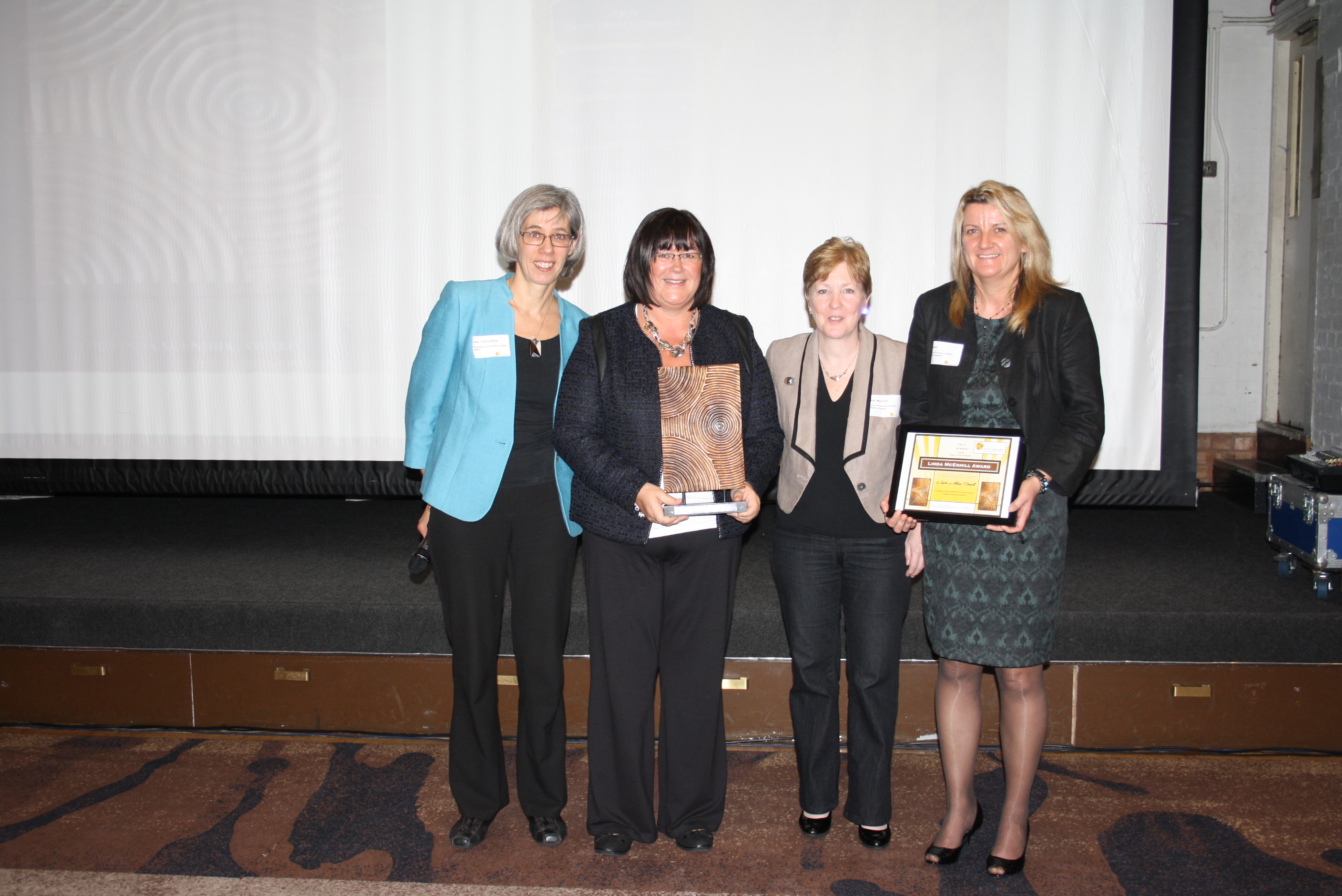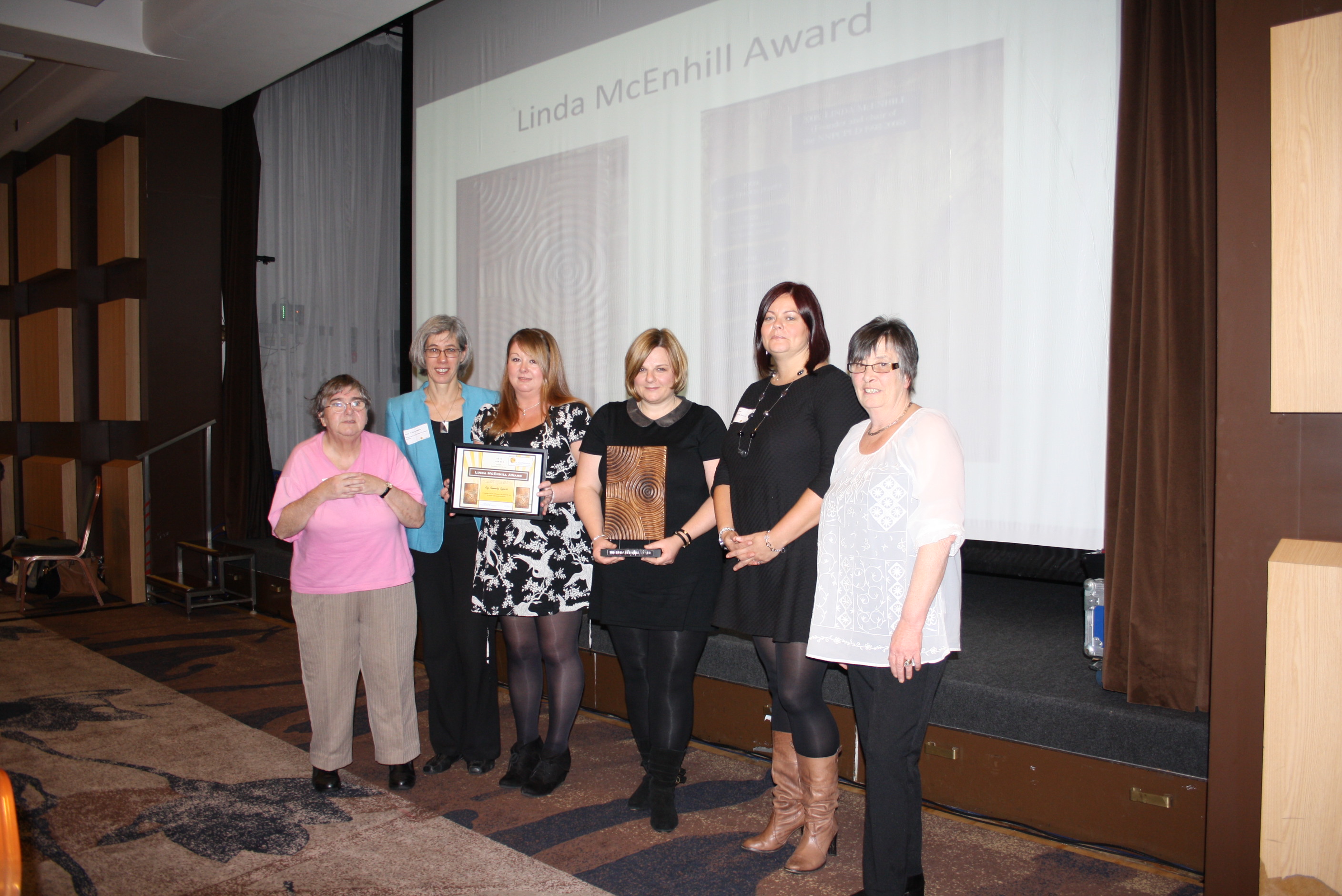2013 Winners
Winner: Liz Smith and Allison O’Donnell, Project Leads, The Prince & Princess of Wales Hospice (PPWH), Glasgow
Category: New development/innovation/overall excellence in end of life care provision for people with learning disabilities
Nominator: Jackie Husband, PPWH, Glasgow

Left to right: Irene Tuffrey Wijne, Allison O’Donnell, Linda McEnhill, Liz Smith.
When The Prince and Princess of Wales Hospice in Glasgow identified a need to widen access to specialist palliative care services for people with learning disabilities within the hospice, they carried out a scoping exercise that consisted of a series of workshops. There was representation from both learning disability and palliative care staff from across Greater Glasgow and Clyde (GG&C). This was in 2011. From this, Liz Smith (who has a palliative care background) and Allison O’Donnell (who has a learning disability background) have spearheaded a unique project, hosted by their hospice, that is jointly led by practitioners from learning disability and palliative care services. The scope and achievements of this projects are many:
- A variety of educational events have been facilitated across both services.
- Key practitioners have been identified. This role is held by learning disability nurses and palliative care nurses selected from their teams and hospices. They meet regularly to develop skills, knowledge and confidence within a framework of partnership and collaborative working.
- A care pathway has been developed, underpinned by evidence based practice.
- Links have been made at both local and strategic level. All nine learning disability teams and six hospices within GG&C have access to the project. The project has attracted support from the Scottish Government through inclusion in national guidance.
- Hospice staff are supported to respond to any referral of patients (or relatives) with learning disabilities, to ensure that all their needs are assessed and, where possible, met. Individual practitioners receive support and advice, including support for complex cases.
- Development of a website to augment the project is under construction. This will promote examples of best practice and share resources.
The practitioners involved in this project have come to realise that they have a shared philosophy of holistic and patient centred care.The judges were very impressed with the sustained, multi-faceted approach to collaborative working. In recent years, there have been a number of excellent initiatives in collaborative working between palliative care and learning disability services. The work of Liz and Allison stood out because of its sheer scope and the impressive list of achievements in a short space of time. Coming from different professional backgrounds themselves, they have modelled collaborative practice. The judges liked the way this project has grown from listening to the needs of the staff across services in Glasgow. This project appears to go from strength to strength and seems to have become embedded; whilst Liz and Allison’s energy undoubtedly keeps things moving, it seems to be no longer dependent on the input of one or two enthusiastic individuals. We are delighted to present their work as an outstanding example of best practice.
Winner: Staff team of KEY Community Supports in Glasgow
Category: Outstanding end of life support of an individual with learning disabilities
Nominator: Sharon Symon, Speech and Language Therapist, Glasgow

Left to right: Pat Charlesworth, Irene Tuffrey-Wijne, Key Community Supports team represented by Carol Mackie, Gillian McGhee, Helen Low and Sheena White.
The winning staff team consists of Carol Mackie and Gillian McGhee (managers), Geraldine McAnee, Helen Low, Lesley White and Sheena White. For the past 16 years, this team had provided 24-hour support for Joan (not her real name), a woman in her 70s who had severe learning disabilities and an autistic spectrum disorder. Joan lived in a single tenancy flat following a lifetime of institutionalisation. She had adjusted well her new lifestyle and loved her home; staff described her as “funny” and “feisty”. As the people who knew her best, they advocated for her when she became ill and provided loving and highly personalised care during the four months from then until she died.
Joan had severe communication difficulties, and the first signs of illness were picked up by staff but it took much perseverance and the involvement of the community learning disability nurse, before a diagnosis of advanced cancer was obtained – treatment was, at this stage, not considered a possibility. Carol Mackie (team manager) said: “We knew there was something wrong when Joan did not enjoy the hotel stay we had booked for New Year. It was so unlike her! But we had a job convincing anyone to take us seriously. There were no obvious signs of illness. But we knew she wasn’t all right.”
Joan could have been transferred to a hospice, but the staff team decided that it was best for Joan to stay at home, and that they needed to support her. This involved a steep learning curve: none of them had a nursing background and none had ever undertaken palliative care.
Over the following months, a wide range of other professionals and agencies became involved in supporting Joan and the team. A community liaison team nurse from the local hospice was always at available at the end of a phone. Care was coordinated by Anne Jane Barr, the community learning disability nurse, who said: “I felt good as a nurse. I care managed it and enjoyed it. I was very proud of the piece of work, the way everyone worked together, and what we achieved for Joan. It was palliative care as it should be. It felt better than a pay rise.”
As Joan lacked the ability to communicate her wishes for the end of her life, it was down to others to use their knowledge of her to make plans. These covered every aspect of Joan’s life – her physical, psychosocial and spiritual needs. All these were managed well, with careful attention to pain control, as well as ensuring Joan enjoyed life as much as she could.
Joan’s funeral was planned with care to reflect her personality and her life. Again, this was only possible because the Key Housing team knew her and were able to work together to achieve this.
Throughout the period of Joan’s illness the staff from KEY Community Supports, members of the learning disability team, the hospice and others worked together to provide the care she needed. All are now empowered to want to provide the same level of care, should it be necessary, for other clients. A working group has now been set up within KEY Community Supports to discuss liaison with hospitals and to have the role of paid carers acknowledged. There is a new emphasis on having DisDAT (Disability Distress Assessment Tools) completed for all service users who are unable to express their discomfort in words. And a confidence that what was provided for Joan was right, and good. Looking back to that time, on staff member reflects: “It was a horrendous time. It was a beautiful time…”
The judges always have a difficult task in considering the many wonderful and inspiring nominations where staff teams have provided outstanding care to someone within their service. This team stood out for the way in which they took on the unfamiliar task of providing end of life support with gusto and humour. The other agencies involved in this case also deserve recognition. This was a real joint effort, bringing in all relevant expertise and utilising best practice guidelines. There were clear roles for the members of the multidisciplinary team, and an acknowledgement and appreciation of each other’s roles. It is not uncommon for staff teams to disintegrate after such a difficult and intense time, unless everyone is well supported. In caring for Joan, the team not only stayed together but moved forward together, learning from the experience; they will be undoubtedly able to use their new-found expertise again. One judge commented: “Absolutely outstanding and profoundly moving – a deserving winner.”
